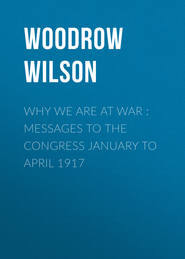По всем вопросам обращайтесь на: info@litportal.ru
(©) 2003-2024.
✖
State of the Union Addresses
Автор
Год написания книги
2019
Настройки чтения
Размер шрифта
Высота строк
Поля
I also renew my recommendation that the Congress pass a law regulating cold storage as it is regulated, for example, by the laws of the State of New Jersey, which limit the time during which goods may be kept in storage, prescribe the method of disposing of them if kept beyond the permitted period, and require that goods released from storage shall in all cases bear the date of their receipt. It would materially add to the serviceability of the law, for the purpose we now have in view, if it were also prescribed that all goods released from storage for interstate shipment should have plainly marked upon each package the selling or market price at which they went into storage. By this means the purchaser would always be able to learn what profits stood between him and the producer or the wholesale dealer.
I would also renew my recommendation that all goods destined for interstate commerce should in every case, where their form or package makes it possible, be plainly marked with the price at which they left the hands of the producer.
We should formulate a law requiring a Federal license of all corporations engaged in interstate commerce and embodying in the license or in the conditions under which it is to be issued, specific regulations designed to secure competitive selling and prevent unconscionable profits in the method of marketing. Such a law would afford a welcome opportunity to effect other much needed reforms in the business of interstate shipment and in the methods of corporations which are engaged in it; but for the moment I confine my recommendations to the object immediately in hand, which is to lower the cost of living.
No one who has observed the march of events in the last year can fail to note the absolute need of a definite programme to bring about an improvement in the conditions of labor. There can be no settled conditions leading to increased production and a reduction in the cost of living if labor and capital are to be antagonists instead of partners. Sound thinking and an honest desire to serve the interests of the whole nation, as distinguished from the interests of a class, must be applied to the solution of this great and pressing problem. The failure of other nations to consider this matter in a vigorous way has produced bitterness and jealousies and antagonisms, the food of radicalism. The only way to keep men from agitating against grievances is to remove the grievances. An unwillingness even to discuss these matters produces only dissatisfaction and gives comfort to the extreme elements in our country which endeavor to stir up disturbances in order to provoke governments to embark upon a course of retaliation and repression. The seed of revolution is repression. The remedy for these things must not be negative in character. It must be constructive. It must comprehend the general interest. The real antidote for the unrest which manifests itself is not suppression, but a deep consideration of the wrongs that beset our national life and the application of a remedy.
Congress has already shown its willingness to deal with these industrial wrongs by establishing the eight-hour day as the standard in every field of labor. It has sought to find a way to prevent child labor. It has served the whole country by leading the way in developing the means of preserving and safeguarding lives and health in dangerous industries. It must now help in the difficult task of finding a method that will bring about a genuine democratization of industry, based upon the full recognition of the right of those who work, in whatever rank, to participate in some organic way in every decision which directly affects their welfare. It is with this purpose in mind that I called a conference to meet in Washington on December 1st, to consider these problems in all their broad aspects, with the idea of bringing about a better understanding between these two interests.
The great unrest throughout the world, out of which has emerged a demand for an immediate consideration of the difficulties between capital and labor, bids us put our own house in order. Frankly, there can be no permanent and lasting settlements between capital and labor which do not recognize the fundamental concepts for which labor has been struggling through the years. The whole world gave its recognition and endorsement to these fundamental purposes in the League of Notions. The statesmen gathered at Versailles recognized the fact that world stability could not be had by reverting to industrial standards and conditions against which the average workman of the world had revolted. It is, therefore, the task of the states men of this new day of change and readjustment to recognize world conditions and to seek to bring about, through legislation, conditions that will mean the ending of age-long antagonisms between capital and labor and that will hopefully lead to the building up of a comradeship which will result not only in greater contentment among the mass of workmen but also bring about a greater production and a greater prosperity to business itself.
To analyze the particulars in the demands of labor is to admit the justice of their complaint in many matters that lie at their basis. The workman demands an adequate wage, sufficient to permit him to live in comfort, unhampered by the fear of poverty and want in his old age. He demands the right to live and the right to work amidst sanitary surroundings, both in home and in workshop, surroundings that develop and do not retard his own health and wellbeing; and the right to provide for his children's wants in the matter of health and education. In other words, it is his desire to make the conditions of his life and the lives of those dear to him tolerable and easy to bear.
The establishment of the principles regarding labor laid down ill the covenant of the League of Nations offers us the way to industrial peace and conciliation. No other road lies open to us. Not to pursue this one is longer to invite enmities, bitterness, and antagonisms which in the end only lead to industrial and social disaster. The unwilling workman is not a profitable servant. An employee whose industrial life is hedged about by hard and unjust conditions, which he did not create and over which he has no control, lacks that fine spirit of enthusiasm and volunteer effort which are the necessary ingredients of a great producing entity. Let us be frank about this solemn matter. The evidences of world-wide unrest which manifest themselves in violence throughout the world bid us pause and consider the means to be found to stop the spread of this contagious thing before it saps the very vitality of the nation itself. Do we gain strength by withholding the remedy? Or is it not the business of statesmen to treat these manifestations of unrest which meet us on every hand as evidences of an economic disorder and to apply constructive remedies wherever necessary, being sure that in the application of the remedy we touch not the vital tissues of our industrial and economic life? There can be no recession of the tide of unrest until constructive instrumentalities are set up to stem that tide.
Governments must recognize the right of men collectively to bargain for humane objects that have at their base the mutual protection and welfare of those engaged in all industries. Labor must not be longer treated as a commodity. It must be regarded as the activity of human beings, possessed of deep yearnings and desires. The business man gives his best thought to the repair and replenishment of his machinery, so that its usefulness will not be impaired and its power to produce may always be at its height and kept in full vigor and motion. No less regard ought to be paid to the human machine, which after all propels the machinery of the world and is the great dynamic force that lies back of all industry and progress. Return to the old standards of wage and industry in employment are unthinkable. The terrible tragedy of war which has just ended and which has brought the world to the verge of chaos and disaster would be in vain if there should ensue a return to the conditions of the past. Europe itself, whence has come the unrest which now holds the world at bay, is an example of standpatism in these vital human matters which America might well accept as an example, not to be followed but studiously to be avoided. Europe made labor the differential, and the price of it all is enmity and antagonism and prostrated industry, The right of labor to live in peace and comfort must be recognized by governments and America should be the first to lay the foundation stones upon which industrial peace shall be built.
Labor not only is entitled to an adequate wage, but capital should receive a reasonable return upon its investment and is entitled to protection at the hands of the Government in every emergency. No Government worthy of the name can "play" these elements against each other, for there is a mutuality of interest between them which the Government must seek to express and to safeguard at all cost.
The right of individuals to strike is inviolate and ought not to be interfered with by any process of Government, but there is a predominant right and that is the right of the Government to protect all of its people and to assert its power and majesty against the challenge of any class. The Government, when it asserts that right, seeks not to antagonize a class but simply to defend the right of the whole people as against the irreparable harm and injury that might be done by the attempt by any class to usurp a power that only Government itself has a right to exercise as a protection to all.
In the matter of international disputes which have led to war, statesmen have sought to set up as a remedy arbitration for war. Does this not point the way for the settlement of industrial disputes, by the establishment of a tribunal, fair and just alike to all, which will settle industrial disputes which in the past have led to war and disaster? America, witnessing the evil consequences which have followed out of such disputes between these contending forces, must not admit itself impotent to deal with these matters by means of peaceful processes. Surely, there must be some method of bringing together in a council of peace and amity these two great interests, out of which will come a happier day of peace and cooperation, a day that will make men more hopeful and enthusiastic in their various tasks, that will make for more comfort and happiness in living and a more tolerable condition among all classes of men. Certainly human intelligence can devise some acceptable tribunal for adjusting the differences between capital and labor.
This is the hour of test and trial for America. By her prowess and strength, and the indomitable courage of her soldiers, she demonstrated her power to vindicate on foreign battlefields her conceptions of liberty and justice. Let not her influence as a mediator between capital and labor be weakened and her own failure to settle matters of purely domestic concern be proclaimed to the world. There are those in this country who threaten direct action to force their will, upon a majority. Russia today, with its blood and terror, is a painful object lesson of the power of minorities. It makes little difference what minority it is; whether capital or labor, or any other class; no sort of privilege will ever be permitted to dominate this country. We are a partnership or nothing that is worth while. We are a democracy, where the majority are the masters, or all the hopes and purposes of the men who founded this government have been defeated and forgotten. In America there is but one way by which great reforms can be accomplished and the relief sought by classes obtained, and that is through the orderly processes of representative government. Those who would propose any other method of reform are enemies of this country. America will not be daunted by threats nor lose her composure or calmness in these distressing times. We can afford, in the midst of this day of passion and unrest, to be self-contained and sure. The instrument of all reform in America is the ballot. The road to economic and social reform in America is the straight road of justice to all classes and conditions of men. Men have but to follow this road to realize the full fruition of their objects and purposes. Let those beware who would take the shorter road of disorder and revolution. The right road is the road of justice and orderly process.
***
State of the Union Address
Woodrow Wilson
December 7, 1920
GENTLEMEN OF THE CONGRESS:
When I addressed myself to performing the duty laid upon the President by the Constitution to present to you an annual report on the state of the Union, I found my thought dominated by an immortal sentence of Abraham Lincoln's–"Let us have faith that right makes might, and in that faith let us dare to do our duty as we understand it"–a sentence immortal because it embodies in a form of utter simplicity and purity the essential faith of the nation, the faith in which it was conceived, and the faith in which it has grown to glory and power. With that faith and the birth of a nation founded upon it came the hope into the world that a new order would prevail throughout the affairs of mankind, an order in which reason and right would take precedence over covetousness and force; and I believe that I express the wish and purpose of every thoughtful American when I say that this sentence marks for us in the plainest manner the part we should play alike in the arrangement of our domestic affairs and in our exercise of influence upon the affairs of the world.
By this faith, and by this faith alone, can the world be lifted out of its present confusion and despair. It was this faith which prevailed over the wicked force of Germany. You will remember that the beginning of the end of the war came when the German people found themselves face to face with the conscience of the world and realized that right was everywhere arrayed against the wrong that their government was attempting to perpetrate. I think, therefore, that it is true to say that this was the faith which won the war. Certainly this is the faith with which our gallant men went into the field and out upon the seas to make sure of victory.
This is the mission upon which Democracy came into the world. Democracy is an assertion of the right of the individual to live and to be treated justly as against any attempt on the part of any combination of individuals to make laws which will overburden him or which will destroy his equality among his fellows in the matter of right or privilege; and I think we all realize that the day has come when Democracy is being put upon its final test. The Old World is just now suffering from a wanton rejection of the principle of democracy and a substitution of the principle of autocracy as asserted in the name, but without the authority and sanction, of the multitude. This is the time of all others when Democracy should prove its purity and its spiritual power to prevail. It is surely the manifest destiny of the United States to lead in the attempt to make this spirit prevail.
There are two ways in which the United States can assist to accomplish this great object. First, by offering the example within her own borders of the will and power of Democracy to make and enforce laws which are unquestionably just and which are equal in their administration-laws which secure its full right to Labor and yet at the same time safeguard the integrity of property, and particularly of that property which is devoted to the development of industry and the increase of the necessary wealth of the world. Second, by standing for right and justice as toward individual nations. The law of Democracy is for the protection of the weak, and the influence of every democracy in the world should be for the protection of the weak nation, the nation which is struggling toward its right and toward its proper recognition and privilege in the family of nations.
The United States cannot refuse this role of champion without putting the stigma of rejection upon the great and devoted men who brought its government into existence and established it in the face of almost universal opposition and intrigue, even in the face of wanton force, as, for example, against the Orders in Council of Great Britain and the arbitrary Napoleonic decrees which involved us in what we know as the War of 1812.
I urge you to consider that the display of an immediate disposition on the part of the Congress to remedy any injustices or evils that may have shown themselves in our own national life will afford the most effectual offset to the forces of chaos and tyranny which are playing so disastrous a part in the fortunes of the free peoples of more than one part of the world. The United States is of necessity the sample democracy of the world, and the triumph of Democracy depends upon its success.
Recovery from the disturbing and sometimes disastrous effects of the late war has been exceedingly slow on the other side of the water, and has given promise, I venture-to say, of early completion only in our own fortunate country; but even with us the recovery halts and is impeded at times, and there are immediately serviceable acts of legislation which it seems to me we ought to attempt, to assist that recovery and prove the indestructible recuperative force of a great government of the people. One of these is to prove that a great democracy can keep house as successfully and in as business-like a fashion as any other government. It seems to me that the first step toward providing this is to supply ourselves with a systematic method of handling our estimates and expenditures and bringing them to the point where they will not be an unnecessary strain upon our income or necessitate unreasonable taxation; in other words, a workable budget system. And I respectfully suggest that two elements are essential to such a system-namely, not only that the proposal of appropriations should be in the hands of a single body, such as a single appropriations committee in each house of the Congress, but also that this body should be brought into such cooperation with the Departments of the Government and with the Treasury of the United States as would enable it to act upon a complete conspectus of the needs of the Government and the resources from which it must draw its income.
I reluctantly vetoed the budget bill passed by the last session of the Congress because of a constitutional objection. The House of Representatives subsequently modified the bill in order to meet this objection. In the revised form, I believe that the bill, coupled with action already taken by the Congress to revise its rules and procedure, furnishes the foundation for an effective national budget system. I earnestly hope, therefore, that one of the first steps to be taken by the present session of the Congress will be to pass the budget bill.
The nation's finances have shown marked improvement during the last year. The total ordinary receipts of $6,694,000,000 for the fiscal year 1920 exceeded those for 1919 by $1,542,000,000, while the total net ordinary expenditures decreased from $18,514,000,000 to $6,403,000,000. The gross public debt, which reached its highest point on August 31, 1919, when it was $26,596,000,000, had dropped on November 30, 1920, to $24,175,000,000.
There has also been a marked decrease in holdings of government war securities by the banking institutions of the country, as well as in the amount of bills held by the Federal Reserve Banks secured by government war obligations. This fortunate result has relieved the banks and left them freer to finance the needs of Agriculture, Industry, and Commerce. It has been due in large part to the reduction of the public debt, especially of the floating debt, but more particularly to the improved distribution of government securities among permanent investors. The cessation of the Government's borrowings, except through short-term certificates of indebtedness, has been a matter of great consequence to the people of the country at large, as well as to the holders of Liberty Bonds and Victory Notes, and has had an important bearing on the matter of effective credit control.
The year has been characterized by the progressive withdrawal of the Treasury from the domestic credit market and from a position of dominant influence in that market. The future course will necessarily depend upon the extent to which economies are practiced and upon the burdens placed upon the Treasury, as well as upon industrial developments and the maintenance of tax receipts at a sufficiently high level. The fundamental fact which at present dominates the Government's financial situation is that seven and a half billions of its war indebtedness mature within the next two and a half years. Of this amount, two and a half billions are floating debt and five billions, Victory Notes and War. Savings Certificates. The fiscal program of the Government must be determined with reference to these maturities. Sound policy demands that Government expenditures be reduced to the lowest amount which will permit the various services to operate efficiently and that Government receipts from taxes and salvage be maintained sufficiently high to provide for current requirements, including interest and sinking fund charges on the public debt, and at the same time retire the floating debt and part of the Victory Loan before maturity.
With rigid economy, vigorous salvage operations, and adequate revenues from taxation, a surplus of current receipts over current expenditures can be realized and should be applied to the floating debt. All branches of the Government should cooperate to see that this program is realized. I cannot overemphasize the necessity of economy in Government appropriations and expenditures and the avoidance by the Congress of practices which take money from the Treasury by indefinite or revolving fund appropriations. The estimates for the present year show that over a billion dollars of expenditures were authorized by the last Congress in addition to the amounts shown in the usual compiled statements of appropriations. This strikingly illustrates the importance of making direct and specific appropriations. The relation between the current receipts and current expenditures of the Government during the present fiscal year, as well as during the last half of the last fiscal year, has been disturbed by the extraordinary burdens thrown upon the Treasury by the Transportation Act, in connection with the return of the railroads to private control. Over $600,000,000 has already been paid to the railroads under this act-$350,000,000 during the present fiscal year; and it is estimated that further payments aggregating possibly $650,000,000 must still be made to the railroads during the current year. It is obvious that these large payments have already seriously limited the Government's progress in retiring the floating debt.
Closely connected with this, it seems to me, is the necessity for an immediate consideration of the revision of our tax laws. Simplification of the income and profits taxes has become an immediate necessity. These taxes performed an indispensable service during the war. The need for their simplification, however, is very great, in order to save the taxpayer inconvenience and expense and in order to make his liability more certain and definite. Other and more detailed recommendations with regard to taxes will no doubt be laid before you by the Secretary of the Treasury and the Commissioner of Internal Revenue.
It is my privilege to draw to the attention of Congress for very sympathetic consideration the problem of providing adequate facilities for the care and treatment of former members of the military and naval forces who are sick and disabled as the result of their participation in the war. These heroic men can never be paid in money for the service they patriotically rendered the nation. Their reward will lie rather in realization of the fact that they vindicated the rights of their country and aided in safeguarding civilization. The nation's gratitude must be effectively revealed to them by the most ample provision for their medical care and treatment as well as for their vocational training and placement. The time has come when a more complete program can be formulated and more satisfactorily administered for their treatment and training, and I earnestly urge that the Congress give the matter its early consideration. The Secretary of the Treasury and the Board for Vocational Education will outline in their annual reports proposals covering medical care and rehabilitation which I am sure will engage your earnest study and commend your most generous support.
Permit me to emphasize once more the need for action upon certain matters upon which I dwelt at some length in my message to the second session of the Sixty-sixth Congress. The necessity, for example, of encouraging the manufacture of dyestuffs and related chemicals; the importance of doing everything possible to promote agricultural production along economic lines, to improve agricultural marketing, and to make rural life more attractive and healthful; the need for a law regulating cold storage in such a way as to limit the time during which goods may be kept in storage, prescribing the method of disposing of them if kept beyond the permitted period, and requiring goods released from storage in all cases to bear the date of their receipt. It would also be most serviceable if it were provided that all goods released from cold storage for interstate shipment should have plainly marked upon each package the selling or market price at which they went into storage, in order that the purchaser might be able to learn what profits stood between him and the producer or the wholesale dealer. Indeed, It would be very serviceable to the public if all goods destined for interstate commerce were made to carry upon every packing case whose form made it possible a plain statement of the price at which they left the hands of the producer. I respectfully call your attention also to the recommendations of the message referred to with regard to a federal license for all corporations engaged in interstate commerce.
In brief, the immediate legislative need of the time is the removal of all obstacles to the realization of the best ambitions of our people in their several classes of employment and the strengthening of all instrumentalities by. which difficulties are to be met and removed and justice dealt out, whether by law or by some form of mediation and conciliation. I do not feel it to be my privilege at present to, suggest the detailed and particular methods by which these objects may be attained, but I have faith that the inquiries of your several committees will discover the way and the method.
In response to what I believe to be the impulse of sympathy and opinion throughout the United States, I earnestly suggest that the Congress authorize the Treasury of the United States to make to the struggling government of Armenia such a loan as was made to several of the Allied governments during the war, and I would also suggest that it would be desirable to provide in the legislation itself that the expenditure of the money thus loaned should be under the supervision of a commission, or at least a commissioner, from the United States in order that revolutionary tendencies within Armenia itself might not be afforded by the loan a further tempting opportunity.
Allow me to call your attention to the fact that the people of the Philippine Islands have succeeded in maintaining a stable government since the last action of the Congress in their behalf, and have thus fulfilled the condition set by the Congress as precedent to a consideration of granting independence to the Islands. I respectfully submit that this condition precedent having been fulfilled, it is now our liberty and our duty to keep our promise to the people of those islands by granting them the independence which they so honorably covet.
I have not so much laid before you a series of recommendations, gentlemen, as sought to utter a confession of faith, of the faith in which I was bred and which it is my solemn purpose to stand by until my last fighting day. I believe this to be the faith of America, the faith of the future, and of all the victories which await national action in the days to come, whether in America or elsewhere.











